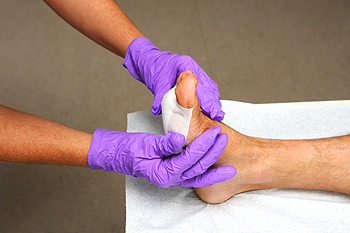Connect With Us
Blog

Diabetic wound care is a critical aspect of managing diabetes-related complications, particularly concerning foot health. Diabetes can affect wound healing due to vascular and neuropathic issues that result from high blood sugar levels. Reduced circulation and oxygenation in tissues, coupled with neuropathy-induced numbness, make foot wounds more susceptible to infections. Individuals experiencing poor wound healing due to diabetes-related nerve and blood vessel damage may encounter additional complications, including heart disease, kidney disease, and eye problems. Additionally, if an untreated wound becomes infected, the infection may extend locally to affect muscle and bone, a condition known as osteomyelitis. Untreated infections also can progress to gangrene, a significant cause of amputations in individuals with diabetes. In severe cases, uncontrolled infections can lead to sepsis, wherein the infection spreads into the bloodstream, posing a life-threatening situation. A podiatrist is trained to manage diabetic wounds in the feet. If you are living with diabetes or have concerns about wound care, it is suggested that you schedule an appointment with a podiatrist for a full exam and treatment options.
Wound care is an important part in dealing with diabetes. If you have diabetes and a foot wound or would like more information about wound care for diabetics, consult with one of our podiatrists from Biebel & DeCotiis Podiatry Associates. Our doctors will assess your condition and provide you with quality foot and ankle treatment.
What Is Wound Care?
Wound care is the practice of taking proper care of a wound. This can range from the smallest to the largest of wounds. While everyone can benefit from proper wound care, it is much more important for diabetics. Diabetics often suffer from poor blood circulation which causes wounds to heal much slower than they would in a non-diabetic.
What Is the Importance of Wound Care?
While it may not seem apparent with small ulcers on the foot, for diabetics, any size ulcer can become infected. Diabetics often also suffer from neuropathy, or nerve loss. This means they might not even feel when they have an ulcer on their foot. If the wound becomes severely infected, amputation may be necessary. Therefore, it is of the upmost importance to properly care for any and all foot wounds.
How to Care for Wounds
The best way to care for foot wounds is to prevent them. For diabetics, this means daily inspections of the feet for any signs of abnormalities or ulcers. It is also recommended to see a podiatrist several times a year for a foot inspection. If you do have an ulcer, run the wound under water to clear dirt from the wound; then apply antibiotic ointment to the wound and cover with a bandage. Bandages should be changed daily and keeping pressure off the wound is smart. It is advised to see a podiatrist, who can keep an eye on it.
If you have any questions, please feel free to contact one of our offices located in Holmdel and Middletown, NJ . We offer the newest diagnostic and treatment technologies for all your foot care needs.
